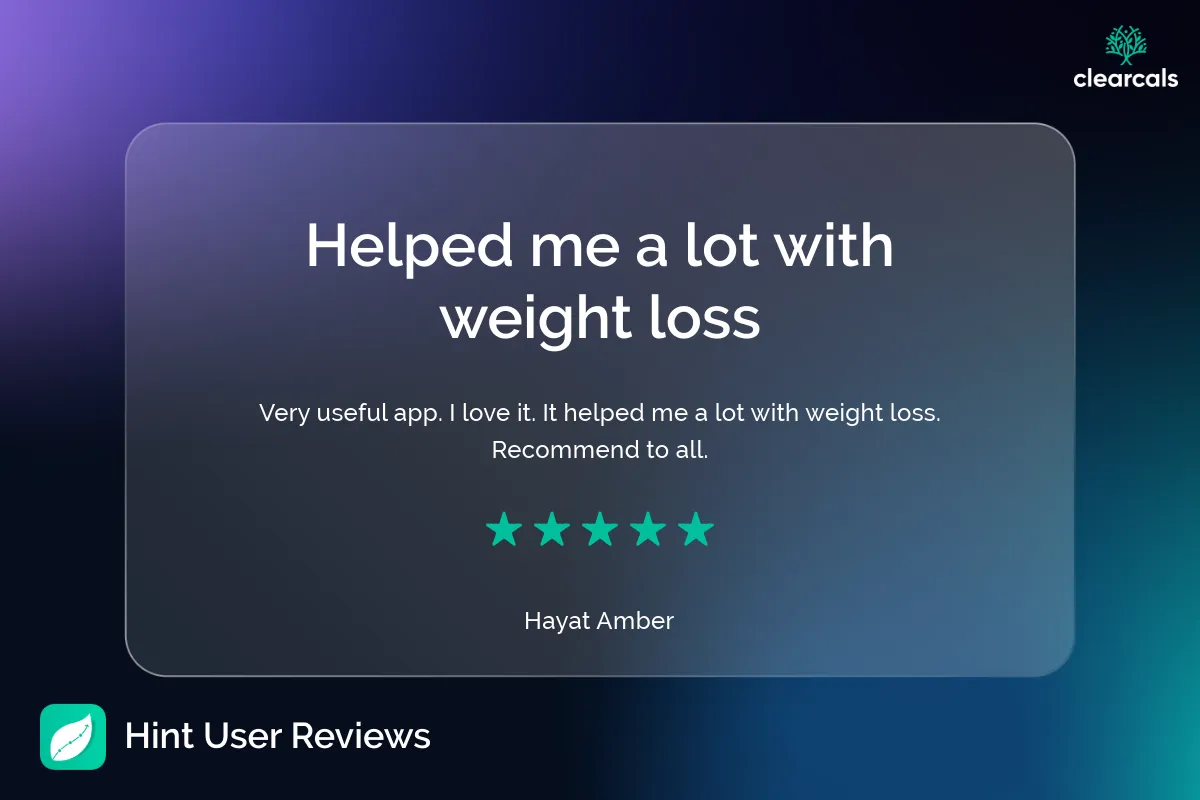Looking for a Personalized Diet Plan?
Is ghee good for weight loss?

TLDR
- Ghee is calorie-dense, with around 45 kcal per teaspoon.
- It contains healthy fats and essential vitamins (A, D, E, K).
- In moderation, ghee can support weight loss due to its fat-burning and satiety-promoting properties.
Introduction
Ghee, a staple in Indian cuisine, is known for its rich flavor and health benefits.
But when it comes to weight loss, the role of ghee is often debated. This high-calorie food, with approximately 45 kcal per teaspoon, can be beneficial if used mindfully.
Let’s explore how ghee fits into a weight-loss diet, how to use it, and how the Hint app can help you manage its calories.
Calories in Ghee
Because ghee is pure fat, its calories come entirely from healthy fats, which provide lasting energy but must be consumed within a balanced diet.
Use the Hint app’s free calorie and macronutrient tracking features to monitor your intake and incorporate ghee in moderation.
1 Spoon Ghee Calories and Other Serving Sizes
1 tsp (5g)
: 45 kcal
1 tbsp (15g)
: 135 kcal
2 tbsp (30g)
: 270 kcal
100g Ghee Calories and Other Serving Sizes
20g Ghee
: 180 kcal
100g Ghee
: 895 kcal
Ghee’s high caloric content means that portion control is essential.
The Hint Pro and Hint Premium subscriptions offer guidance on balancing fats, carbs, and proteins in meals, helping you make informed choices about your ghee intake.
Here is a table of how calories increase with quantity.
| Ghee Quantity (in grams) | Ghee Calories (kcal) |
|---|---|
| 1 teaspoon ghee calories ( 5 grams) | 45 |
| 1 tablespoon ghee calories (15 grams) | 135 |
| Half a cup of ghee calories (50 grams) | 450 |
| 1 Small cup of ghee calories (100 grams) | 895 |

Ghee Nutrition Facts
Ghee is entirely composed of fat, with 0% carbohydrates and protein.
However, it’s packed with fat-soluble vitamins A, D, E, and K, which support metabolic health and nutrient absorption, key components in a balanced weight-loss diet.
Key Nutrients in Ghee:
Vitamins
: A, D, E, K
Healthy Fats
: Includes CLA and MCTs
Ghee Benefits for Weight Loss
Here are some of the potential benefits of ghee for weight loss:
- Fat-Burning Potential: CLA in ghee is linked to increased fat-burning and lean muscle maintenance, aiding in weight management.
- Enhanced Satiety: The fats in ghee, especially MCTs, promote fullness, which can help reduce overall calorie intake.
- Better Nutrient Absorption: Ghee helps absorb fat-soluble vitamins, supporting overall health and aiding in metabolism.
How to Use Ghee for Weight Loss
If you’re wondering how much ghee per day for weight loss is ideal, start with a teaspoon or two daily and adjust based on your total calorie intake. Ghee can replace other fats, adding flavor and nutrition to meals.
The Hint app helps track your ghee intake, calories, and macros, ensuring you stay within your weight-loss goals.

Does Ghee Increase Weight?
Yes, ghee can lead to weight gain if overused due to its high-calorie density. However, does ghee make you fat? Only if consumed without balance. Moderation is key.
Use ghee as part of a balanced diet alongside physical activity. The Hint app’s calorie tracking ensures you maintain a calorie deficit, crucial for weight loss.
Ghee for Weight Gain
For those looking to gain weight, ghee for weight gain can be beneficial due to its high calories and healthy fats. Adding ghee to meals boosts calorie intake and provides lasting energy, supporting weight gain goals.
You can track your progress with the Hint app, which helps you balance your intake for healthy weight gain.
How to Use Ghee for Fatty Liver Health
Although ghee has some saturated fat, is ghee good for fatty liver? Studies suggest that moderate ghee intake, as part of a low-fat, balanced diet, may support liver health due to its CLA content.
However, individuals with fatty liver should consult a dietitian or physician before adding ghee to their diet.
Desi Ghee Calories and Health Benefits
Desi ghee, made from cow’s milk, is nutritionally superior to processed ghee. It contains CLA, which is linked to fat loss, lean muscle gain, and improved metabolism.
Incorporating desi ghee into your diet can support weight loss when used within your calorie limits.
Does Desi Ghee Increase Weight?
Consuming desi ghee in moderation does not inherently lead to weight gain. However, excessive intake can increase your calorie surplus.
Monitoring your intake is key, and the Hint app’s tracking features can help ensure that you’re staying within your weight-loss or maintenance goals.
Conclusion
Ghee can be a valuable addition to a weight-loss diet, thanks to its unique composition of CLA, MCTs, and essential vitamins.
By using it in moderation, ghee can support fat burning, reduce appetite, and aid in nutrient absorption.
Achieving sustainable weight loss requires more than just a single food; it involves balanced eating, regular exercise, and mindful choices. The Hint app offers free calorie and macronutrient tracking, making it easy to monitor your intake and control portions.
For a more structured approach, Hint Pro and Hint Premium’s weight loss diet plans and Pro Workouts provide a comprehensive solution, guiding you on your journey to a healthier, balanced lifestyle.





